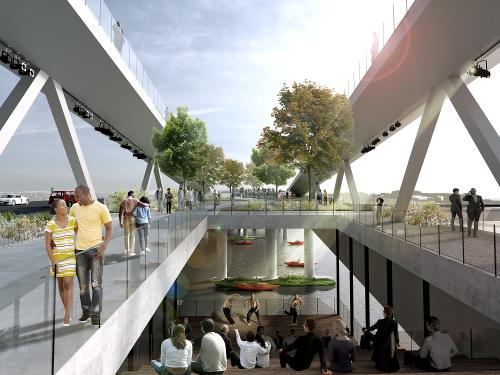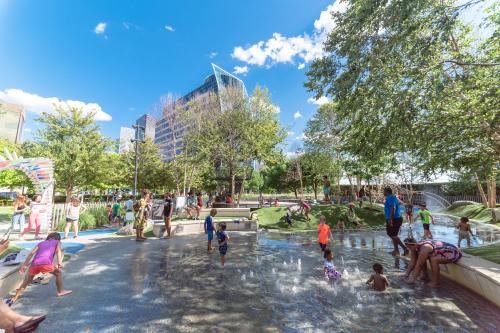Placemaking Postcards is a blog series from the Bass Center for Transformative Placemaking at Brookings where policymakers and practitioners guest-author promising placemaking efforts from across the U.S. and abroad that foster connected, vibrant, and inclusive communities. In line with the principle tenets of placemaking, the goal of the series is to recognize the community as the expert, highlight voices from the field, and to create a community of learning and practice around transformative placemaking.
 America’s unequal geography of opportunity is widening: big, dense metropolitan areas are leading the way in employment and wage growth, job density, and prosperity, as many small towns and rural areas are still struggling to recover from the Great Recession.
America’s unequal geography of opportunity is widening: big, dense metropolitan areas are leading the way in employment and wage growth, job density, and prosperity, as many small towns and rural areas are still struggling to recover from the Great Recession.
Given these social and economic cleavages, rural Main Streets today evoke a complex sense of place. On one hand, they are often thought of— even romanticized—as tight-knit communities with distinct local culture, homegrown businesses, and a more laid-back lifestyle; on the other, they represent a way of living that, to some, seems at odds with our globalized, networked digital economy. Indeed, these communities face deep structural challenges—including low population density, long distances to major job hubs, declining manufacturing activity, and resource constraints—that aren’t likely to be overcome with traditional approaches to economic development.
So where does this leave small rural towns looking to revitalize their communities in the face of widening geographic divides? And what role can transformative placemaking play in reinvigorating their local economy?
A look at Wytheville, Va.—a small town of 8,000 situated in the foothills of the Blue Ridge Mountains—provides some insight.
Spurring economic revitalization through rural entrepreneurship
In the 1950s, Wytheville’s downtown was booming. Businesses lined the Main Street, and a vibrant soda shop served as its anchor. But about fifty years later, the soda shop was gone, and the struggling downtown faced challenges that are familiar to many small towns across southwest Virginia coal country. As industry declined, so did the town’s jobs and population, causing businesses to close and vacancies to increase, leaving few anchors or amenities to draw people to Main Street.
The town decided to start with what it had locally: aspiring entrepreneurs looking to launch their own businesses.
To address these challenges, Wytheville adopted a person- and place-based approach to leverage local assets, build regional partnerships, encourage community capacity-building, and ultimately revitalize its regional economy. Three years ago, the town’s place governance organization, Downtown Wytheville, Inc., made it its mission to bring economic vitality back to Main Street. It completed a major downtown streetscape renovation, improving sidewalks, lighting, and crosswalks on Main Street, to create a more vibrant downtown. But leaders realized that Wytheville required more than physical changes to its landscape to spur revitalization: it needed human capital and the necessary skills to drive small business development and growth.
The town decided to start with what it had locally: aspiring entrepreneurs looking to launch their own businesses.
Investing in people is critical for community revitalization
While Wytheville recognized entrepreneurship as a critical tool for economic development, particularly for rural communities, leaders also knew that a lack of human capital and resources meant they would need more than small loans and financial incentives to create a supportive entrepreneurial environment. In addition to capital, residents need access to the skills training, mentorship, and resources required to create a locally-led and sustainable entrepreneurial environment.
And the first step in making this happen? A small business competition designed to build community capacity, make long-term investments in residents, and create a self-sustaining entrepreneurial ecosystem.
In 2018, Downtown Wytheville applied for and received a Community Business Launch Grant from the Virginia Department of Housing and Community Development and launched the competition, Evolution Wytheville. After receiving funding, Downtown Wytheville partnered with the Joint Industrial Development Authority of Wythe County and the Wytheville-Wythe-Bland Chamber of Commerce to recruit local businesses and build partnerships with downtown property owners—some of whom agreed to offer incentives, like reduced rent, to have competition winners locate in their storefronts.
The competition was open to anyone looking to start a business in the downtown district, and leaders conducted a local and regional awareness campaign to attract new and expanding businesses. After advertising with local media outlets and sharing a promotional video on social media, 30 aspiring entrepreneurs signed up. Town leaders narrowed it down to eight finalists and matched them with mentors, required them to take six entrepreneurship courses (ranging from financials and cash flow to business and legal structure), and asked them to present detailed business plans to a panel of local business leaders. Judges evaluated plans on the amount of foot traffic the business would generate, the number of jobs it would create, and the quality of the overall plan.
Four winners eventually took home $75,000 in prize money—two winners each opened breweries, one a Vietnamese bakery, and the other an art school. Participants highlighted the importance of not just the grant, but also the skill-building efforts. As the art school owner said: “The money we received and the publicity we got from winning were huge, but even before we won, we quickly saw our business grow based on what we learned,” she said. Now, classes are filling up so quickly that she’s planning to hire additional instructors.
By combining skills-building with mentorship and networking opportunities, places are using this model to lay the foundation for a strong and inclusive entrepreneurship environment, where nontraditional entrepreneurs can access the tools they need to launch their businesses.
This kind of capacity-building is a critical component of revitalization efforts across the country—including programs like Grow North in Minnesota, which provides online resources, in-person education, and opportunities to connect with other entrepreneurs, and TrepConnect in Albuquerque, N.M., an app that matches entrepreneurs to local resources and services. By combining skills-building with mentorship and networking opportunities, places are using this model to lay the foundation for a strong and inclusive entrepreneurship environment, where nontraditional entrepreneurs can access the tools they need to launch their businesses.
This model is important not only for spurring small business growth, but for ensuring that prosperity is locally-led, sustainable, and widespread across more members of the community.
Small-scale, place-based strategies can bring lasting impact
Today, thanks to walkable streets, new retail shops, restaurants, and breweries, a rural Main Street previously suffering from decline, population loss, and a lack of amenities, is now seeing new business growth and investment. This momentum is reflected in public and private reinvestment data: In 2018, the Downtown Wytheville district received $800,000 in public reinvestment and $5.7 million in private investment. To continue to reap these benefits, Wytheville is investing in additional efforts to nurture and sustain its entrepreneurial culture, offering free business classes and marketing assistance to residents and incentives like meal tax incentives, façade improvements, and signage programs to small businesses.
Ultimately, Wytheville’s effort to boost entrepreneurship is not just about the winners of the business competition or other downtown Wytheville business owners—it is about improving the quality of life and access to quality places for an entire community. While such efforts cannot erase the geographic and demographic challenges Wytheville and other small rural towns like it face, they are helping to drive small-scale, regionally inclusive economic growth and showing the importance of centering people and place when doing so.
Note: Downtown Wytheville, Inc. is a part of Main Street America, a national network of more than 1,600 neighborhoods and communities who share a commitment to creating high-quality places and to building stronger communities through preservation-based economic development.






Commentary
How a rural Virginian town is using entrepreneurship to boost its local economy
August 1, 2019